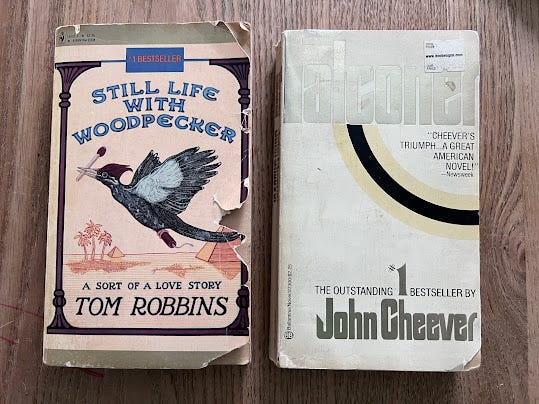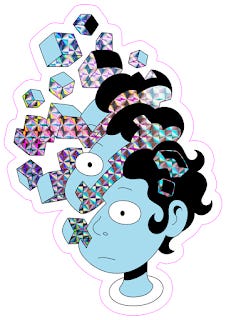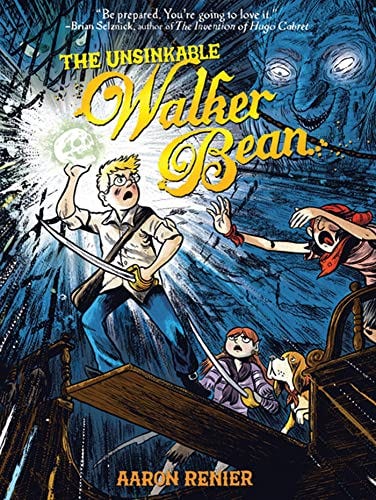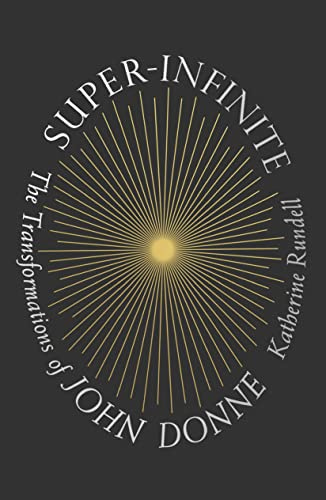.
What good times we are having in Reading Land! Silly gorilla! Sex of all sorts! Wild science fiction! Metaphysics! Baby, it does not get better than this.
.
087) Banana Sunday by Paul Tobin and Colleen Coover, finished August 2
I've bumped into this husband/wife creative team before. This was their first outing (newly colored and reprinted) and it definitely feels like a) a first work and b) work by people who will find their greatest success writing for younger teens. (That's not a slam.)
Girl has to bring talking monkeys to school. Chaos ensues. That's all you need to know.
several days
088) Falconer by John Cheever, finished August 3
Crummy upper-middle class guy addicted to heroin kills his brother and heads to prison (the Falconer of the title) where he hears many, many stories, gets clean, stagnates, gets clean, takes part in a revolt that does not happen, falls in love, and finally has a classic midcentury epiphany of . . . something, to close it out.
I'm not sure I've ever read Cheever before. Best known for his short stories (though you can find people who will call this his masterpiece and of course it is, that's why he wrote it, only novelists get to have masterpieces).
It's well written and a fine (if essentially plotless) novel. It's loaded with unpleasantness (the sex, the violence, the guards, the drugs, the rich people, the poor) but somehow I never found it nihilistic, which is a fancy trick.
under three months
089) Still Life with Woodpecker by Tom Robbins, finished August 3
I've been told to read Tom Robbins for almost twenty years now and I totally get why. He funny. And the games he plays with language are akin to the games I play—I've just spent a lot of time building a governor. But I absolutely loved watching the man break everything. This is the book you can write when you're the hottest thing going (this came out in 1985).
Part of the reason I haven't read him is that I find his name intensely forgettable. Somewhere on Thutopia I've written about a paragraph from Even Cowgirls Get the Blues which I would link to know except certain posts Google just chooses to ignore for unknown reasons and that's one of them. Should you find it, you'll see me being unimpressed by some writing Lady Steed was appalled by. And out of context, his writing is, essentially, nonsense.
But it's fun to read, even when I feel he's being too cute by half.
He also takes great delight in writing about sex in new and fanciful ways. And that is frankly more interesting than aliens or travels inside Camel packaging or explosions or anything else that happens because sex is famously difficult to write about interestingly. So good on him making the effort and largely succeeding. (Although repeating peachfish and placing a peachclam on the same page of one may be evidence that creativity can only get you so far.)
One thing about the authorial voice in this book is how it allows for lots of riffing on theme (eg, love) but also riffing on literally anything (eg, blackberries, cocaine, mongooses, pyramids).
Get one for the horny/comedic redhead in your life.
two years, more or less
090) Homunculusby Joe Sparrow, finished August 5
I picked up this and a companion Sparrow volume earlier this year. Can't remember why. But this short tale about an AI that survives the apocalypse is simple and charming and maybe even beautiful.
one sitting
091) Cuckoo by Joe Sparrow, finished August 9
This longer story improves on the skills we saw hinted at in Homunculus. In this one, a girl has an interaction with an alien in her backyard and years later, certain effects begin to take place. The story is aesthetically fascinating and plays some old alien games in delightful new ways.
I honestly don't want to say much more than that. Better to let you discover it on your own.
saturday and wednesday
092) Fatal by Kimberly Johnson, finished August 16
Johnson's book composed on the occasion of her husband's death consists of poems alphabetized by letter, each of which begins with the letter F, interspersed with alphabetized forms of American death, also beginning with the letter F (eg, fatigue), from the year 2001, the year her son was born and "suddenly, the whole world seemed fatal" (79).
The poems are individually successful, a few trends of form or content make veins through the collection. Although there were hints throughout, it wasn't till "Funerals" that the (then) pending death of her husband took control of the narrative. I think that poem is the keystone of the collection (though perhaps this metaphor is off as it appears so near the end), providing the strength that turns all the other poems toward its power.
One poem that seemed particularly timely to me, having just seen Oppenheimer and as I am currently reading a John Donne biography, was "Fission" which discusses Oppenheimer and how Trinity's name was inspired by Donne. One section of the poem, in fact, is an erasurelike poem created from Donne.
under a week
093) The Unsinkable Walker Bean by Aaron Renier, finished August 17
The style of art, the youthful protagonists, the cross of fantasy and pirates—all that, I admit, led me to have low expectations for this graphic novel. And the book hit everything I expected but it delivered each at such a high level that it just amazed me. This is a great book!
three days
094) The Infinite Future by Tim Wirkus, finished August 22
This could have different covers and attract different audiences. Some cool pulp cover with people approaching a mountain cabin while in the background a star battle rages. It could be a list of names (eg, The Infinite Future / starring Irena Sertôrian / in Household Tales of our Sertôrian / by Gretjen (?) Bombal / in The Agony and the Ecstasy of Sister Úrsula / by Sister Úrsula / by Eduard Salgado-MacKenzie / as created by the Cooper siblings / translated by Danny Laszlo / in The Infinite Future / by Tim Wirkus) in a delightful and pushy font treatment.
It's a complicated book. But it largely has the conviction of its complications. Most of its run time is an introduction (by Laszlo) to a science-fiction story (by Salgado-MacKenzie) which makes up the last, oh, 40% of the book. The intro is largely designed to suggest that, for those who have eyes to see, Salgado-MacKenzie's work is brilliant, potentially life-changing. If you have eyes to see.
It may take a while to sink in but I suspect I do not have eyes to see. I like the games Wirkus is playing here and the individual pieces are good but the introduction is simply much more enjoyable than the recovered text it introduces. The afterward works at crosspurposes to the intro, suggesting that those who find intense value in the text are probably wrong.
This isn't me trying to tear the book down. I loved Wirkus's first novel and I'm glad he's still stretching himself, whether I loved it or not. Much hay was made in MoLit circles about the Mormon Studies character and rightly so. She's a terrific creation. And the characters all are generally well constructed and lovely to spend time with. The science-fiction notions are wildly creative and delightful. I think if the surrounding text had spent less time both building them up and tearing them down they could have stood just fine on their own feet. In a way, this is like a Vonnegut novel chocked full of descriptions of Kilgore Trout novels and then the last, oh, 40% of the book had been a Kilgore Trout novel. Vonnegut made Trout a bad novelist. Wirkus made Salgado-MacKenzie a possibly great one and that's tough to do. How do you write something better than yourself?
I know, I know, it's really only supposed to be different (and because Laszlo wrote both, it doesn't have to be that different). Although Laszlo's afterword seems to swing far from the voice we've experienced throughout.
Anyway. It's ambitious and interesting and I enjoyed it quite a lot. Who cares if it's not a masterpiece?
And seriously. Put it in paperback with a hella pulpy cover and see what happens!
three weeks maybe
095) Super-Infinite: The Transformations of John Donne by Katherine Rundell, finished August 23
I love John Donne. I wouldn't say I've spent much time reading him recreationally, but the times I've genuinely looked at him, so great. This book told me so much about him I didn't know. We can call it a biography, but each chapter is about one of his identities (eg, student, husband) arranged basically chronologically (obviously, identities don't start and stop; they overlap).
Anyway, it's a good read (Rundell, in addition to being a Renaissance scholar, is a YA novelist; this doesn't feel like YA, but storytelling skills be storytelling skills). It's the first book about Donne I've read (there are many! including new ones!) but I dug it. Easy recommendation to make if you like Donne or are the least bit interested.
certainly less than a month









